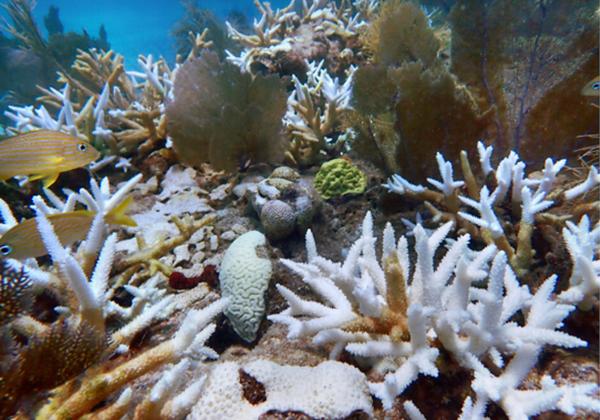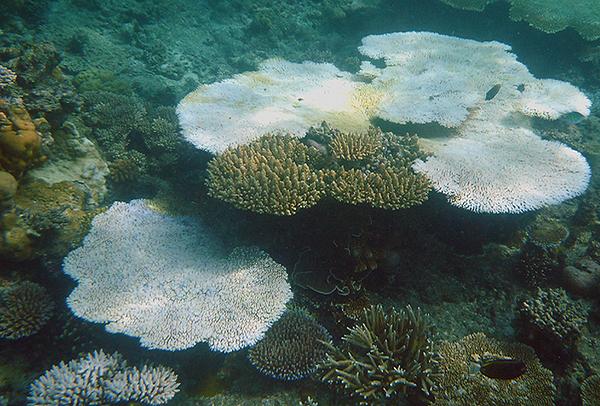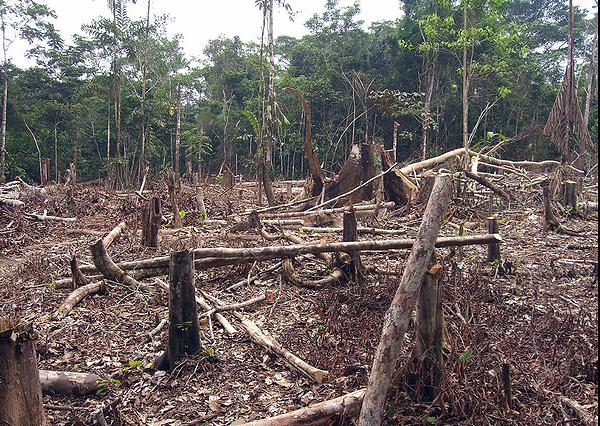
EXETER, England, October 13, 2025 (ENS) – “The world has entered a new reality. Global warming will soon exceed 1.5°Celsius.” Warm-water coral reefs are dying across the planet as the world hits its first climate tipping point, finds a new report released today by the University of Exeter and dozens of international partners. The only way to avert planetary disaster is to act urgently, triggering “positive tipping points,” advises the Global Tipping Points Report 2025.
“We are rapidly approaching multiple Earth system tipping points that could transform our world, with devastating consequences for people and nature. This demands immediate, unprecedented action from leaders at COP30 and policymakers worldwide,” Professor Tim Lenton from the Global Systems Institute at the University of Exeter said.
This second Global Tipping Points Report finds that warm-water coral reefs – on which nearly a billion people and a quarter of all marine life depend – are now passing their tipping point. Widespread dieback is occurring, and unless global warming is reversed, extensive reefs as we know them will be lost. However, “small refuges may survive and must be protected,” the report states.
Authored by 160 scientists from 87 institutions in 23 countries, the report warns that the planet is dangerously close to triggering other catastrophic tipping points – from melting ice sheets to Amazon rainforest dieback and the collapse of key ocean currents.
The “new reality” is certain to galvanize at least some of the world leaders set to attend the United Nations’ annual climate conference, known as COP30, opening a month from today in Brazil.
“The Global Tipping Points Report 2025 comes at a time of urgency – but also of possibility,” COP30 President-designate, Ambassador André Corrêa do Lago wrote in his Foreword to the Global Tipping Points Report 2025.

“As the world prepares to gather in Belém for COP30, from 10-21 November in the heart of the Brazilian Amazon, science warns us of ecosystems approaching dangerous thresholds. Yet this same science also shows us the extraordinary potential of positive tipping points: self-reinforcing shifts in policies, technologies, finance, and behaviors that can drive change at unprecedented speed and scale,” Corrêa do Lago said.
He said the negotiations seek to galvanize an Action Agenda embracing all levels of policy makers, businesses, civil society and indigenous groups – not just central governments.
“Brazil’s vision for COP30 is to transform the narrative of tipping points from fear to hope. We must prevent irreversible harm but equally trigger positive tipping points that can propel societies towards low-carbon, resilient development and inclusive prosperity. This requires collective effort – a Global Mutirão – where all nations and communities act together, by choice, to build a future not imposed by catastrophe, but designed through cooperation. The COP30 Action Agenda embodies this approach,” the president-designate said.
The Brazilian Presidency has designated COP30 as the “implementation COP, ” Corrêa do Lago said during a visit to the World Meteorological Organization, WMO, in September. Countries are being urged to commit to more ambitious climate action plans, called Nationally Determined Contributions, NDCs, to implement the Paris Agreement on climate.
It is a decisive year, not just because it marks the 10th anniversary of the Paris Agreement.
The lower Paris Agreement temperature target of keeping temperatures to 1.5°C below the pre-industrial era is in jeopardy, Corrêa do Lago said. “The past 10 years were the warmest on record and 2024 was the first calendar year to exceed 1.5°C above the pre-industrial era.”
The International Coral Reef Initiative warned in April that between January 1, 2023 and March 30, 2025, bleaching-level heat stress impacted 84 percent of the world’s reefs, with 82 countries, territories and economies suffering damage.

During the first global coral bleaching event in 1998, 21 percent of reefs experienced bleaching-level heat stress, rising to 37 percent in the second event in 2010 and 68 percent during the third event (2014-2017).
Scientists called the fourth global coral bleaching event “unprecedented” as early as May 2024, and a widely-used bleaching prediction platform had to add three new levels (Levels 3-5) to their Bleaching Alert Scale to indicate the heightened risk of mass coral mortality. Level 5 indicates the risk of over 80 percent of all corals on a reef dying due to prolonged bleaching.
“We know coral bleaching is accelerating as our oceans warm, driven by the world’s continued reliance on fossil fuels. As an atoll nation, we see our reefs damaged and livelihoods threatened. We must urgently end the fossil fuel era and transition to a just, sustainable future powered by clean energy. Our oceans and the communities that depend on them cannot wait,” President of the Pacific island nation of Palau Surangel Whipps Jr., said.

Corals bleach when environmental stressors such as heat cause them to expel the colorful, energy-producing algae that live inside them, leaving them white. If conditions return to normal quickly enough, corals can regain their algae and return to health. However, if the water stays too hot for too long, the corals die.
“Let’s not beat around the bush. Corals are bleaching and dying primarily because the ocean is warming at an alarming rate, as evidenced by the sheer scale of this Fourth Global Bleaching Event. The ocean is warming primarily because of accumulating greenhouse gases emitted by humankind’s ongoing burning of fossil fuels. In short, if we want coral reefs to survive, we must drastically reduce our emissions and keep global warming to below 1.5 degrees Celsius, Ambassador Peter Thomson, the UN Secretary-General’s Special Envoy for the Ocean, said.
Coral Reefs Bleach in Overheated Oceans
- – Warm-water coral reefs are vital to the wellbeing of up to a billion people and almost a million species around the world.
- – Globally, coral reefs are experiencing unprecedented mortality under repeated mass bleaching events, highlighting the impact that global warming (interacting with other, predominantly human-driven environmental stressors is already having.
- – The central estimate of the thermal tipping point for warm-water coral reefs of 1.2°C global warming above pre-industrial is already exceeded and without stringent climate mitigation their upper thermal threshold of 1.5°C may be reached within the next 10 years, compromising reef functioning and provision of ecosystem services to millions of people.
- – Even under the most optimistic emission scenarios of stabilizing warming at 1.5°C without any overshoot, it is considered that warm-water coral reefs are virtually certain (>99% probability) to tip, given the upper range of their thermal tipping point is 1.5°C.
- – The goal of the Paris Agreement to limit global warming “well below 2°C” or 1.5°C will not prevent coral reefs from irreversibly passing their thermal tipping point.
Global Tipping Point Report Recommendations
- – Returning global mean warming below 1.2°C with a minimal overshoot period and eventually returning to 1°C above preindustrial is essential for retaining functional warm water coral reefs at meaningful scale, beyond a relatively few isolated refuge areas.
- – Minimizing non-climatic stressors, particularly improved reef management, can give reefs the best chance of surviving under what must be a minimal exceedance of their thermal tipping
point.
- – Risk assessments and urgent policy responses are needed to address the ecosystem and livelihood impacts of degraded or nonfunctional reefs.
Reactions Range From Alarmed to Determined
Dr. Mike Barrett, chief scientific adviser at the nonprofit WWF-UK and a co-author of the report, warns that the findings are “incredibly alarming.”
“That warm-water coral reefs are passing their thermal tipping point is a tragedy for nature and for the people who rely on them for food and income. This grim situation must be a wake-up call: unless we act decisively now, we will also lose the Amazon rainforest, the ice sheets, and vital ocean currents. In that scenario, we would face a truly catastrophic outcome for all humanity,” Dr. Barrett said.
“COP30 in Belém will be more than just a climate conference,” WMO Secretary-General Celeste Saulo said. “COP30 aspires to be a turning point, a moment when the world shifts from ambition to implementation. At the heart of this transformation lies science. Science is our compass,” she said.
“Science is clear: extreme weather and climate change impacts are worsening. The question before us is not whether we act, but whether we act in time, together, and with the courage required. The cost of action may seem high. The cost of inaction is much higher,” said Saulo.
Not Just Corals
The report finds that the temperature that would trigger widespread dieback of the Amazon rainforest is lower than previously thought, with the lower end of the estimated range now at 1.5°C, showing the need for urgent action.

Over a 100 million people depend on the Amazon, and it could also be subject to positive social tipping points: inclusive local governance, including by Indigenous People, recognition of traditional knowledge, and targeted investments in conservation and restoration could boost the resilience of people and nature, the report finds.
And there’s yet another danger. The Atlantic Meridional Overturning Circulation is a system of ocean currents that circulates water within the Atlantic Ocean, bringing warm water north and cold water south. The report shows that this system is at risk of collapse even below 2°C of global warming. “This would result in much harsher winters in northwest Europe, disrupt the West African and Indian Monsoons, and decrease agricultural yields in much of the world,” with major impacts on global food security,.
Report contributor Dr. Manjana Milkoreit from the University of Oslo said, “Current policy thinking doesn’t usually take tipping points into account. Tipping points present distinct governance challenges compared to other aspects of climate change or environmental decline, requiring both governance innovations and reforms of existing institutions.”
Positive Tipping Points – Solar and Wind
Yet the report also highlights progress on positive tipping points and opportunities for positive change.
Positive tipping points have already been crossed in solar PV and wind power globally, as well as in the adoption of electric vehicles, battery storage, and heat pumps in leading markets. Coordinated policy action, it says, can trigger further transformative change across sectors and societies, according to the Stockholm Resilience Centre at the University of Stockholm in Sweden, a co-author of the report.
Stockholm Resilience Centre researcher Dr. Laura Pereira served as the “equity and justice” liaison for the report’s Risks chapters and also contributed to the Human Rights chapter together with former Centre MSc student Ida Edling. Their work shows that climate tipping points are deeply intertwined with social justice and human rights.
“Whilst we are entering an unprecedented phase of human-induced change to the planet, there remains time to act and to create a more sustainable and just future for all. The findings of this report require a strong reckoning with our current social and economic systems, which have led to this moment of potentially imminent cascading crises across our planet and societies, whilst offering some of the transformative solutions we must undertake to enable a more just and sustainable future,” Dr. Pereira said.
“We cannot address the climate crisis by perpetuating the same systems of injustice and oppression that caused it in the first place. We need deeper, more equitable solutions that allow a sustainable future for both people and planet,” she said.

At the University of Exeter, Professor Lenton said we need to do much more to bring global warming under control. “There has been a radical global acceleration in some areas, including the uptake of solar power and electric vehicles. But we need to do more – and move faster – to seize positive tipping point opportunities,” he advised. “By doing so, we can drastically cut greenhouse gas emissions and tip the world away from catastrophic tipping points and toward a thriving, sustainable future.”
The report calls on global leaders ahead of COP30 in Brazil to embed tipping point science into governance, economic planning, and adaptation policies. Researchers are working with Brazil’s COP30 Presidency to ensure that tipping points are included on the summit’s agenda.
“Positive tipping points need to be well governed to ensure a rapid and just transition,” the report advises, hopefully. “Governance can create the enabling conditions for positive tipping, including easing access to finance, providing the necessary infrastructure to support rapid deployment and cultivating sufficient stakeholder engagement and public support for policies to be approved and implemented.”
Professor Lenton concluded, “Only with a combination of decisive policy and civil society action can the world tip its trajectory from facing existential Earth system tipping point risks to seizing positive tipping point opportunities.”
Featured image: Blistering Coral Sea temperatures from February to April 2024 led to the Great Barrier Reef’s fifth mass bleaching event in eight years, turning patches of staghorn and other coral species white. 2024 (Photo by Ove Hoegh-Guldberg)
© 2025, Environment News Service. All rights reserved. Content may be quoted only with proper attribution and a direct link to the original article. Full reproduction is prohibited.



